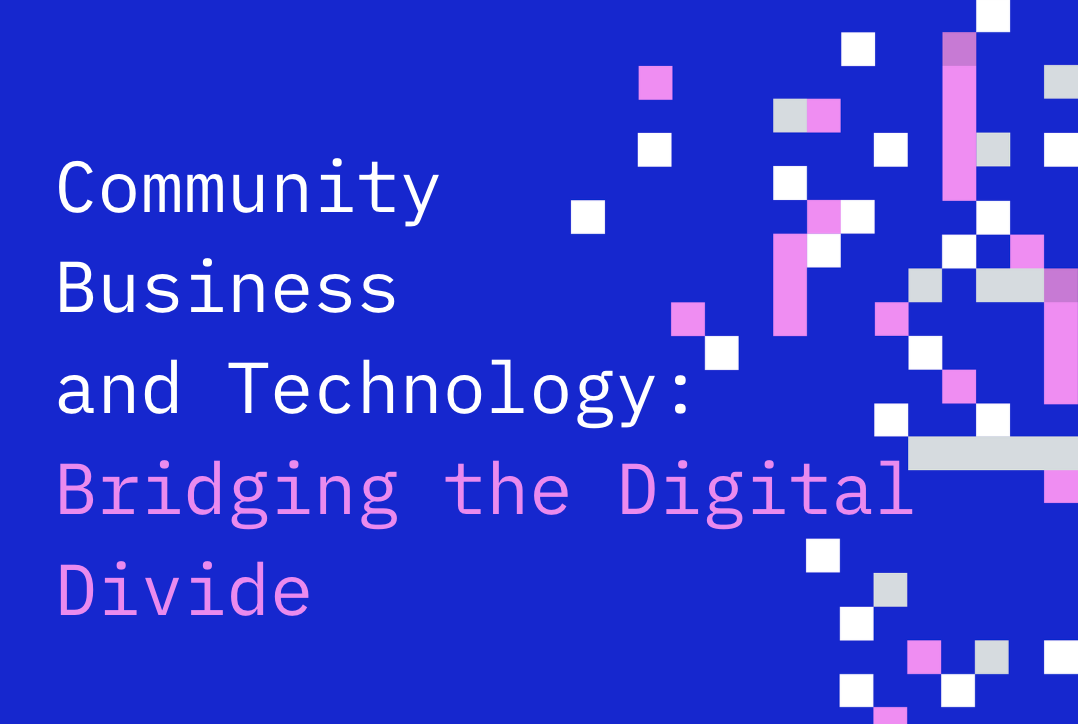Why Community Businesses Must Shape the Future of Technology
by Malu Villela, Peter Bloom and Anna Dent
Community businesses — rooted in local places, trading with purpose, and delivering vital services — now stand at a defining moment.
As digital technologies and artificial intelligence (AI) rapidly reshape every sector, these organisations approach the future with a mix of curiosity and caution. Our latest report offers an in-depth look at how community businesses across the UK are engaging with technology and data. What we see is a quiet but determined digital shift — full of promise, yet hemmed in by deep-rooted structural barriers. Despite growing recognition of their social impact, too little attention has been paid to the specific digital and data needs of community businesses. This lack of insight leads to poorly fitted solutions, limited policy support, and missed opportunities for innovation. Worse still, it risks widening the digital divide and deepening ethical dilemmas.
From Adoption to Transformation: Reclaiming Tech for Communities
Digital technology is now woven into the everyday fabric of community businesses. Most use it for communication, service delivery, data handling and coordination. But moving from mainstream tools to custom-built systems or AI-driven insights remains a leap too far for many. While 71% of respondents were familiar with “community technology” — tools built with, by, or for communities — fewer than half had actively embraced these approaches. The barriers are clear: limited budgets, lack of in-house digital skills, and the overwhelming dominance of corporate platforms. Yet the ambition is real. As one participant said:
“It feels empowering to have ownership of tech for the community.”
The appetite exists. What’s missing is the support to realise it.
Data Dreams Deferred: Unlocking Community Value
Data is another crucial — and largely untapped — asset. Community businesses understand its power: to shape services, demonstrate impact, and advocate for change. But many struggle with collecting, managing and using data meaningfully. There’s a pressing need for better access to detailed demographic, environmental and civic data. Yet these efforts are often slowed by privacy concerns, low-quality inputs, and the tension between ease of access and actionable insight. Moreover, many organisations feel that the current data landscape favours numbers over nuance. Funders focus on metrics, while the rich stories of lived experience — the heart of social value — are overlooked. Still, a handful of pioneering organisations are forging new paths. They’re using participatory data practices, open data standards and community-owned infrastructures to reimagine what ethical, inclusive data can look like.
AI at the Crossroads: Caution Meets Potential
AI represents both a spark of possibility and a source of unease. 83% of respondents see its potential to streamline services and deepen engagement. But only a third have taken steps to adopt it. The reasons are twofold: practical challenges — lack of funding, skills, and relevant applications — and deeper ethical concerns around privacy, bias, and power. The concept of “community AI” — systems designed and governed by communities themselves — sparked both hope and doubt. Interviewees envisioned AI tools that reflect local values, redistribute resources, and increase transparency. But realism tempers enthusiasm. As one respondent noted:
“I would love the idea that a community AI concept could compete. I just don’t believe it… millions of pounds is not enough.”
The desire is there. The means are not.
Turning Potential into Power: What Must Change
To bridge the gap between interest and implementation, we must invest in community businesses — not just with funding, but with infrastructure and know-how. This includes digital audits, hands-on technical support, tailored training, and peer learning networks. Shared standards around data ethics, privacy and governance must also be developed — and upheld. Most critically, community technology initiatives need targeted investment to compete with the scale and speed of commercial tech giants. We also need to rethink how tech is built and governed. Cross-sector collaboration, accessible infrastructure, inclusive AI design, and alternative governance models are all essential. Small, sustainable AI systems — not extractive, monolithic models — could deliver more equitable outcomes. But getting there will require sustained, coordinated action from policymakers, funders, researchers and community leaders alike.
Why Inclusion Can’t Wait
Without bold and meaningful intervention, digital inequality will only grow deeper. Community businesses are not just service providers — they are trusted anchors of resilience, knowledge and connection. They’re tackling everything from food insecurity to mental health and climate justice. Their approach to tech centres ethics, inclusion and social value — not just speed or scale. That makes them uniquely positioned to shape a fairer digital future. But if we leave them out of digital transformation, we risk leaving entire communities behind.
Community Tech: From Grassroots to Game-Changer
There’s reason to be hopeful. Several interviewees compared the current moment to the early days of the community energy movement — a grassroots effort that eventually influenced national policy and reshaped market norms. Community technology could follow the same path — if we give it the chance. As the digital world charges ahead and Big Tech’s power grows ever more entrenched, community businesses offer something radically different: a people-first, values-driven vision for technology. The question isn’t whether they can shape the future — it’s whether we’ll give them the tools, trust, and traction to do it.


